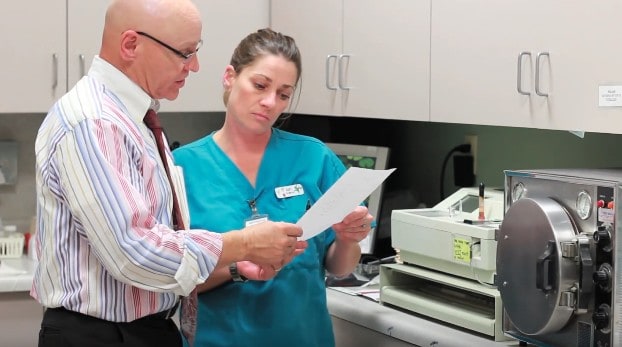Laboratory work for animals helps ensure your pet is given the appropriate care and treatment they need for long and healthy life. Find out more about how we approach lab testing at Care Animal Hospital, as well as its benefits for your pet.
Why does my pet need laboratory work?
As a starting point, it is always a good idea to pay attention to your pet and look for signs and symptoms that might be an indication of illness or disease in your pets. But, there is only so much you can spot on your own, and lab work enables your vet to see the entire picture.
A majority of illnesses can be treated and cured in pets for as long as there is early detection. With laboratory work such as complete blood count (CBC), urinalysis, and/or fecal testing among others, your vet will be able to check for any specific abnormalities that might need further examination.

Pet laboratory work does wonders for understanding your pet’s overall health. For pet owners, lab work ensures that your pet is given the proper treatment to detect and treat illness, while also minimizing long term impact. It also helps provide adequate information on the status of your pet’s vitals that will aid in prevention in the long run.
Types of Laboratory Work
Below are the different types of laboratory testing we conduct here at Care Animal Hospital.
- Complete Blood Count (CBC)
- Blood Chemistry test
- Urinalysis
- Fecal testing
- Cytology
- Thyroid test
- Parasite infestation check
- Heartworm exam
Benefits of Pet Laboratory Work
- Helps prevent the onset of diseases through monitoring
- Enables vets to see complications prior to the display of symptoms in your pet
- A clear result of your pet’s overall health and wellness
- Allows vets to determine the effectivity of ongoing treatments
- Identification of your pet’s candidacy for surgery and/or anesthesia
- Fast and reliable diagnosis of problem areas
What does a Complete Blood Count (CBC) show?
Conducting a CBC allows your local veterinarian to gauge your pet’s platelet count as well as it’s ratio against your pet’s white and red blood cells.
During the test, your vet will be able to observe signs of clotting, anemia, as well as certain deficiencies in the body that might lead to the root of the problem such as your pet’s organs.
As a whole, the test is able to examine your pet’s immune system response, as well as any unseen abnormalities that need special attention.
When do I bring my pet in for laboratory work?
Your pet may need a lab test when he/she displays signs of lethargy, diarrhea, vomiting, increased or decreased urination and elimination, loss of appetite as well as sudden weight loss.
These factors may be indications of a larger, underlying issue within your pet’s system that may need further assessment.
It’s also essential that you bring your pet in as soon as you see abnormalities develop. Both you and your vet would like to prevent damage from happening, and early lab tests can help in early detection and cure.
How often does my pet need laboratory work?
Generally speaking, your pet should undergo laboratory tests every 1-2 years for maintenance checks and observation.
For newborn and young pets under 6 months old, it is recommended to go through a standard CBC procedure to examine the pet’s development and growth. This enables a Care Animal Hospital vet to set a comparison point for the next time you bring them in for testing.
Since senior dogs and cats are more likely to develop complications due to their older age, it is recommended you bring them in for lab work once a year.
